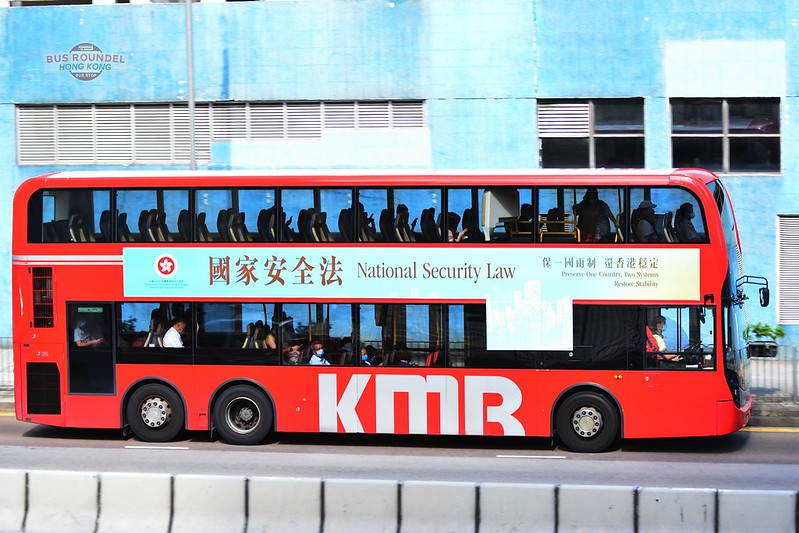China Enacts Hong Kong Security Law; India Bans Dozens of Chinese Apps
Lawfare's biweekly roundup of U.S.-China technology policy and national security news.

Published by The Lawfare Institute
in Cooperation With

China Enacts Hong Kong Security Law, While Exchanging Sanctions With the United States
On June 29, China’s National People’s Congress (NPC) passed new national security legislation applicable to Hong Kong. The new security law uses sweeping provisions to criminalize secession, terrorism, collusion with foreign powers and subversion of the Chinese government. Chinese authorities first proposed the national security law in May, though they did not make public its text until June 30, after its enactment. Since its initial proposal, analysts widely believed the law would erode Hong Kong’s political autonomy from Beijing, and its announcement drew thousands of Hong Kong residents to the streets in protest. Now that its specific provisions have been released, commentators have continued to characterize it as a “radical change” for the city and a step toward authoritarianism.
The national security law’s criminal provisions resemble those governing the Chinese mainland, and they allow life imprisonment for “principal offenders” in the aforementioned categories of activity—which are defined broadly. The law also establishes a mainland-run agency in Hong Kong—the Office for Safeguarding National Security—which has the authority to take control of security investigations from local law enforcement. Central Chinese authorities will wield significant influence over the law’s interpretation and application. Mainland China will retain jurisdiction over “complex” cases brought under the law, including those that involve foreign collusion. And Hong Kong’s courts have no authority to interpret the national security law. The power of interpretation instead lies with the NPC, as preliminary reports on the law’s provisions suggested would be the case.
In recent days, the United States has implemented a series of sanctions and other restrictions on China, as China moved toward enacting the law. Secretary of State Mike Pompeo announced on June 26 that the United States would impose visa restrictions on current and former Chinese officials involved in undermining liberty in Hong Kong. On June 29, the State Department banned all sales of defense-oriented equipment to the city, indicating it would later extend the ban to items with dual civilian and military use. The Commerce Department that same day stated that Hong Kong would be subject to existing restrictions on sales of certain technology goods to mainland China. And on June 26, the Senate passed a bill to impose mandatory financial sanctions on individuals or companies supporting restrictions on freedom in Hong Kong. These measures would apply also to banks dealing with such companies or individuals.
China has responded with tit-for-tat sanctions of its own. On June 29, days after Pompeo’s announcement, a Chinese spokesperson said that Beijing would impose visa restrictions on Americans citizens with “egregious conduct relating to Hong Kong.” (As of yet, neither the United States nor China has specified the names of individuals subject to their respective visa restrictions.) While China has not yet threatened specific countermeasures to other U.S. moves, its response suggests sanctions between the two countries will continue to escalate—particularly if the Senate bill is signed into law. The two countries have also recently sparred with retaliatory restrictions on each other’s citizens in areas unrelated to Hong Kong, including in media and journalism. After China expelled U.S. journalists from three major papers in March, Washington imposed work restrictions on some Chinese journalists employed in the United States.
The United States will likely implement more Hong Kong-related sanctions against China going forward. President Trump himself said in May that he would end Hong Kong’s preferential trading status—which is predicated on the city’s political autonomy from China—if the law took effect. However, what precise measures the Trump administration will enact remains uncertain. Some analysts, including some Hong Kong politicians, have speculated that Washington might impose broader financial sanctions against the city—such as preventing its major banks from accessing the U.S. financial system. Maneuvers like this would have a far larger impact on China than those used to date, as they could stifle Chinese access to global capital markets. Others, however, are skeptical Trump will take such steps. On June 19, Trump remarked that he refrained from sanctioning China over its conduct in Xinjiang so as not to jeopardize his phase one trade deal; many observers have taken this to mean he will avoid sanctions on Hong Kong too.
Escalating U.S.-China tensions over Hong Kong emerge as relations between the two countries have reached a historic nadir. Recently, the Trump administration has criticized China harshly over its handling of the coronavirus, while China has fiercely rebuked such attacks. China’s new national security law has also drawn broader condemnation on the international stage. Last month, the Group of 7 nations released a statement criticizing China over its actions in Hong Kong. And U.K. Prime Minister Boris Johnson offered a pathway to British citizenship for an estimated 3 million Hong Kong residents, should China enact its law. China has characterized foreign critiques of its Hong Kong policies as ploys that use the city as a pretext to forestall China’s development. It has also accused the United States of hypocrisy in supporting the Hong Kong democracy protests, given Trump’s forceful handling of domestic protests following the killing of George Floyd.
India Bans Dozens of Chinese Apps, Citing Security Concerns
India’s Ministry of Electronics and Information Technology (MeitY) on June 30 blocked WeChat, TikTok, BaiduMaps and dozens of other Chinese mobile apps. Per MeitY’s order, users in India will be unable to access the apps on their phones, and app stores operating in India will be barred from offering them.
In a statement, MeitY said the decision came after the Indian government received “credible inputs that such apps pose [a] threat to [the] sovereignty and integrity of India,” and added that the Indian government had received numerous complaints about how the apps in question handle data security and privacy. In issuing the order, MeitY invoked Section 69A of India’s 2000 Information Technology Act, which gives the government broad authority to cut “public access of any information through any computer resource” in the interest of security, public order or sovereignty.
New Delhi’s announcement comes amid calls to retaliate against China following a June 15 clash at the border between the two countries that left 20 Indian soldiers dead. On June 17, Indian officials said they would block state-run telecom companies from purchasing equipment from Chinese firms, including Huawei and ZTE for 4G networks. Officials have also privately warned Indian telecom operators against working with Chinese companies for future 5G networks.
Although the two sides reached an agreement to defuse tensions at the border on June 23, domestic political sentiment in India had already hardened against China: Protesters burned images of Chinese President Xi Jinping and called for a boycott of Chinese goods, and analysts argued that India should adopt a more muscular foreign policy to counter Beijing. Earlier in June, OneTouch AppLabs, an Indian tech startup, had released an App called “remove China apps,” which helped users identify and delete Chinese apps on their phone. The app was downloaded more than 4 million times before being taken down by Google for violating its policies, which prohibit apps that incentivize users to delete other apps.
In a statement, Zhao Lijian, China’s foreign minister, expressed concern about the decision to ban the Chinese apps. “The Indian government has the responsibility to uphold the legitimate and legal rights of the international investors including the Chinese ones,” he said. The Global Times, a mouthpiece for the Chinese Communist Party, wrote that “[b]anning global apps like TikTok and SHAREit will not only affect these companies but also the thousands of Indian IT workers working for these companies. It is also a step toward slowing down globalization, which has proven extremely beneficial for both Asian nations.”
The newly banned Chinese apps stand to lose significant revenue from the blacklisting. India had been the biggest growth market for Chinese mobile apps between 2015 and 2019, and many analysts argue that the country’s digital market continues to have the world’s greatest growth potential. In the case of TikTok, a video-streaming platform that has also prompted security concerns in the United States for its alleged links to the Chinese government, India had accounted for 611 million total downloads, or 30.3 percent of TikTok’s global total. In a statement, TikTok said that they had been invited to meet with government stakeholders and “submit clarifications” related to the “interim” order. But MeitYs official statement did not include provisions indicating that the order was “interim” or otherwise temporary.
India’s decision spotlights the potential for growing conflict between the two countries in the cyber domain. Indian news outlets reported that, following the June 15 clash, India saw a dramatic uptick in cyberattacks from China. An op-ed in the Hindustan Times, a paper with wide readership in India, argued that New Delhi should respond with targeted information operations in the cyber domain aimed at exposing embarrassing secrets of Chinese officials. Analysts at the Quint, another Indian publication, have suggested that India needs to carefully consider what hardware it imports from China, given its security implications.
Other News
A report published this week presents evidence that the Chinese government has subjected its Uighur populations—and other minorities in its western provinces—to sweeping, systematic policies of forced birth control. The report, published by Adrian Zenz, a longtime researcher of China’s Uighur policies, indicates that forced birth control is far more widespread than was previously understood. Reportedly, China employs a broad range of tactics for controlling population growth, including mandatory contraception, sterilization practices and forced abortions. Chinese officials have additionally sent—or threatened to send—noncompliant individuals to the government’s mass Uighur detention camps operated in Xinjiang. Birth rates in some predominantly Uighur areas, pursuant to these policies, have dropped 60 percent. According to Zenz, the report’s findings are the strongest evidence yet that China’s Uighur policies meet U.N. criteria for genocide. China’s Ministry of Foreign Affairs characterized allegations presented in the report as “disinformation,” calling them “groundless.” However, leaders in the U.S. (as well as the European Union) have already criticized China over the allegations. The day the report was released, Secretary of State Mike Pompeo referred to it as “shocking,” and the State Department issued a press release condemning the CCP’s actions. These developments emerged shortly after the U.S. House and Senate each passed bipartisan legislation that would sanction Chinese officials involved in the country’s Xinjiang policies.
The Federal Communications Commission (FCC) on June 30 designated Chinese telecom companies Huawei and ZTE as national security threats. As a result of this classification, U.S. telecom providers are barred from purchasing the two Chinese companies’ equipment with subsidies from the FCC’s Universal Services Fund. The FCC had initially voted in November 2019 to block this fund from subsidizing companies that threaten national security; it also then proposed that Huawei and ZTE be designated as threats. The agency’s June decision formalizes that initial designation. The FCC and other U.S. officials have argued since 2019 that Huawei and ZTE threaten security because they could be forced to cooperate with Beijing in espionage activities. As evidence of this threat, officials frequently cite a Chinese national security law compelling companies to provide data to the government, if requested. (Huawei and ZTE deny they would be forced to do this.) The FCC’s latest ruling comes amid a slew of recent U.S. restrictions aimed against Chinese telecom companies like Huawei and ZTE. In May, the Trump administration prohibited companies all over the world from selling certain products to Huawei made with American technology. More measures along these lines appear forthcoming. One FCC commissioner, after the June 30 decision, spoke of the need to “prioritize” removing from U.S. networks any products made by companies that threaten national security.
On June 22, senior leaders from China and the European Union held a video summit, which replaced high-level dialogues interrupted earlier this year by the coronavirus pandemic. Recently, diplomatic talks between the two sides have entered a deadlock. One cause is China’s reluctance to open its economy to trade and investment, which diplomats report led Germany to postpone a summit between President Xi and European leaders earlier this year. Another cause is human rights. Earlier in June, the European Parliament passed a resolution calling upon member states to bring China to the International Court of Justice should it enact its proposed national security law for Hong Kong—which China did on June 29. The June 22 meeting did little to ease recent tensions. China was unresponsive to the European bloc’s exhortations to advance stalled negotiations on trade and investment deals. European leaders also expressed “great concern” over China’s new national security law for Hong Kong. Following the meeting, EU Commissioner Ursula von der Leyen emphasized the importance of EU-China collaboration, though she stressed the urgent need to make progress in these two areas. Commentators, observing a less favorable tone from European officials following the meeting, have argued that it represents a negative turn in EU-China relations. The EU-China summit also follows a contentious meeting earlier in June between U.S. and EU officials, where the European side pledged not to “choose sides” between the United States and China. After the June 22 meeting, Secretary of State Pompeo renewed calls for the European Union and United States to adopt a unified stance regarding China.
A Chinese study published on June 29 detected a novel strain of flu among pig farms in China. The study, and other experts who reviewed its findings, stress that the disease is worth monitoring since it has the potential to turn into a pandemic. The virus—which scientists term G4 EA H1N1, or G4 for short—is descended from H1N1, the strain of swine flu that swept across the world in 2009. (In 2009, H1N1 killed about 285,000 people worldwide.) The G4 virus is not yet an immediate threat, and so far, there is no evidence of it passing easily from human to human (versus from pigs to humans). Yet experts fear the disease could mutate to become more transmissible; scientists are further concerned by G4’s rising prevalence among Chinese pigs. The new G4 flu strain could have an enormous global impact were it to morph into another pandemic. Yet even short of this, it could feed into U.S.-China antagonism. With the United States harshly critical of how China has handled the coronavirus pandemic, the threat of another disease arising within its borders may only exacerbate these tensions.
Commentary
In the Washington Post, Henry Olsen argues that the right way to curb China’s growing influence is for the United States to introduce a limited industrial policy. In the South China Morning Post, Alex Lo says that Hong Kong’s national security law will help the city put chaos behind it and become more prosperous. For Brookings, Paul Gewirtz contends that if Washington wants to build alliances to address the challenges presented by Beijing, it must understand that Europe sees the China challenge primarily in economic terms. In the New York Times, Vijay Gokhale argues that, rather than trying to change the world order, China will seek to control it, by co-opting international institutions.
For Defense One, Michael Schuman maintains that the United States may be overestimating China’s economic, political and technological prowess. In the Hindustan Times, Pukhraj Singh argues that India should calibrate a cyber doctrine to perform information operations against China. For The Hill, Jianli Yang and Lianchao Han maintain that other nations should follow the United States in putting sanctions on Chinese officials involved in Uighur detention programs.
The Asia Society Center on U.S.-China Relations, the Bertelsmann Stiftung, and the George Washington University China Policy Program have released a new report on changing U.S. and European views of, and relations with, China. The report points out that Trump’s Europe policy has eroded trust that would have been useful in coordinating a unified approach to China.
For Lawfare, Sean Mirski and Shira Anderson map out the various suits American state governments, businesses and interest groups have filed against Chinese entities for damages caused by the coronavirus. Justin Sherman unbundles a Senate report that finds fault with the executive branch’s oversight of Chinese state-owned telecommunications firms. And Bruce Riedel explains the historical and strategic dimensions of the recent skirmish that took place at the China-India border.



.png?sfvrsn=4156d4f8_5)
-(1)-(1).png?sfvrsn=1bc11cd_4)

